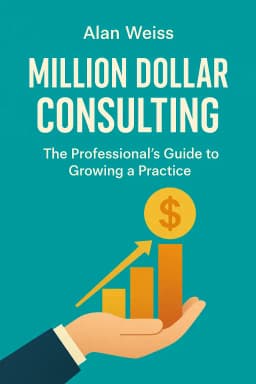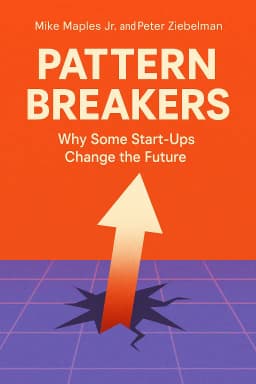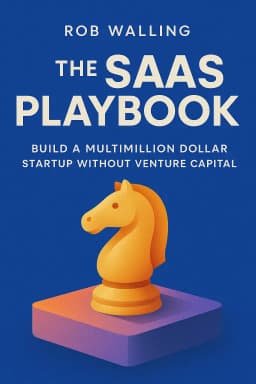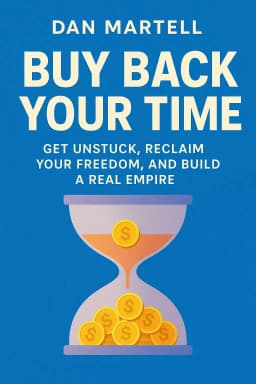
The Architect's Mind: Building a Life of Purpose, One Idea at a Time
Golden Hook & Introduction
SECTION
Nova: Have you ever felt like your interests are all over the map? You're curious about tech, but also ancient history. You love data, but also art. It can feel scattered, but what if that's actually your greatest strength? The legendary Steve Jobs once said you can't connect the dots looking forward, only backward. But what if there's a way to be more intentional about collecting those dots in the first place?
sfj59krxwv: That's a question that I think resonates with so many people who feel like they're supposed to be on one single, linear path.
Nova: Exactly! And that's the core idea we're exploring today from Steve Glaveski's fantastic book, 'Employee to Entrepreneur.' We're so lucky to have sfj59krxwv here, whose analytical and curious mind is the perfect lens for this. Welcome!
sfj59krxwv: Thanks for having me, Nova. I'm excited to dig in. This book feels less like a business manual and more like a user guide for a curious brain.
Nova: I love that! A user guide for a curious brain. Well, today we'll dive deep into this from two perspectives. First, we'll explore why deliberately collecting diverse experiences is the secret to finding your passion. Then, we'll discuss the crucial mindset shift required to stop just thinking and start doing by making small, smart bets.
Deep Dive into Core Topic 1: The Dot Collector's Advantage
SECTION
Nova: So, let's start with that first idea. sfj59krxwv, as someone who loves exploring new ideas, does that concept of 'collecting dots' resonate with you, this idea that you have to trust they'll connect later?
sfj59krxwv: It absolutely does. It speaks to the value of interdisciplinary thinking. But it also feels a bit scary, right? It requires a leap of faith that your seemingly random interests will eventually form a coherent picture.
Nova: It does! And the author, Steve Glaveski, is a perfect case study. He wasn't a born entrepreneur. His story is a masterclass in collecting dots. He started his career in very traditional corporate roles at big firms like EY and Macquarie Bank. You'd think that would set him on a very straight path.
sfj59krxwv: The classic 'golden handcuffs' career track.
Nova: Precisely. But while he was doing that, his 'dots' were all over the place. He was running a heavy metal nightclub on the side. He got a certificate in journalism. He was an avid reader, devouring books on philosophy, psychology, and business. He traveled extensively, and those weren't just holidays. He describes a trip to India where the stark contrast between his five-star hotel and the extreme poverty he witnessed on the streets fundamentally changed his thinking. It wasn't just a trip; it was a 'dot' of empathy and perspective.
sfj59krxwv: So these weren't just hobbies. They were inputs. He was feeding his brain with wildly different data sets. The corporate world gave him one set of models—structure, process, finance. The nightclub gave him another—marketing, community building, dealing with chaos. Travel gave him a third—empathy, global perspective, resilience.
Nova: Exactly! And when he finally started his own company, Collective Campus, which helps big corporations innovate like startups, he wasn't just drawing on his business experience. He was connecting all those dots. He understood corporate pain points, but he also had the creative, scrappy mindset from his side projects. He had a deeper 'why' fueled by what he saw in the world. The book makes it clear: he couldn't have planned that. He had to live it first.
sfj59krxwv: That's a powerful reframe. Society tells us to specialize, to pick a lane and become the best at that one thing. But this suggests that being a generalist, or at least having a generalist's curiosity, is the real long-term competitive advantage. It's about building a personal 'portfolio of experiences.' It's a much more resilient strategy than putting all your eggs in one career basket, isn't it?
Nova: It really is. It’s about building a rich database of mental models from different fields. So when you face a new problem, you're not limited to one toolkit.
sfj59krxwv: It makes perfect sense. The most innovative solutions often come from applying a model from one industry to another. But it brings up a critical question for me: how do you balance collecting all these dots with the very real need to develop deep expertise in something? You can't be a dilettante forever, can you?
Deep Dive into Core Topic 2: The Action Equation
SECTION
Nova: That's the perfect transition, because the book argues that the way you develop expertise, and the way you connect those dots, isn't just by studying, but by doing. And in a world changing at an exponential rate, that's more critical than ever.
sfj59krxwv: You mean the old model of 'plan, plan, plan, then execute' is broken?
Nova: Completely broken. Glaveski uses the classic chessboard story to illustrate this. An emperor wants to reward the inventor of chess, who asks for one grain of rice on the first square, two on the second, four on the third, and so on. The emperor agrees, thinking it's a small price. But by the time you get to the 64th square, the number is astronomical—more rice than exists on the planet. That's exponential growth. And that's the world we live in now, thanks to technology.
sfj59krxwv: And in that kind of world, a five-year plan is obsolete in five months. Your analysis is based on a world that no longer exists by the time you're ready to act.
Nova: You've nailed it. The old corporate model was about mitigating risk through analysis. The new entrepreneurial model, the book argues, is about mitigating risk through action—through small, fast, cheap experiments. And the author's first startup, Hotdesk, is the perfect example.
sfj59krxwv: Okay, let's hear it. How did he apply this?
Nova: So, while working as a consultant, he noticed all this empty office space. At the same time, the gig economy was rising. He had an idea: an 'Airbnb for office space.' The old way would be to write a 100-page business plan, raise a million dollars, and spend a year building a perfect platform.
sfj59krxwv: And probably fail, because he wouldn't have actually tested his core assumption.
Nova: Exactly! His core assumption was, 'Will people actually use this?' So instead of a business plan, he ran an experiment. He found a basic website script online for $500 and hired a freelancer to customize it. The total cost for his first prototype, his Minimum Viable Product or MVP, was under $2,500.
sfj59krxwv: That's less than the cost of a few business-class flights.
Nova: Right? He wasn't trying to build a perfect company; he was trying to answer a question. Then, he did something brilliant. He wrote a press release and sent it to dozens of journalists. He got one bite—from The Australian, a major national newspaper. They wanted to run a story. Suddenly, his little side project, which he was still working on while at his day job at Macquarie Bank, was about to be featured in front of 300,000 readers.
sfj59krxwv: Wow. So the 'small bet' wasn't just about the money. It was a bet of his time and attention, but structured in a way that generated maximum data and exposure. He wasn't just building a product; he was building a learning machine.
Nova: A learning machine! That's it. The story got published, it created a huge buzz, and that attention led directly to him securing seed funding. The whole thing, from idea to funding, happened in a matter of months, not years.
sfj59krxwv: It completely flips the script on the concept of failure, too. In the old model, if the business plan is rejected, you've failed. Here, the experiment 'fails' if it doesn't teach you anything, not if it doesn't make money immediately. That's a liberating thought for any analytical person who's afraid of not getting it perfect on the first try. The goal isn't perfection; it's learning.
Nova: And that learning is the expertise you were asking about. You become an expert by running the experiments, by seeing what works and what doesn't in the real world. You connect the dots through action.
Synthesis & Takeaways
SECTION
sfj59krxwv: So, when we put it all together, it's a really elegant two-part framework for living a more intentional life, whether you're an entrepreneur or not.
Nova: It really is. So, let's synthesize. We have these two powerful, interconnected ideas from the book. First, be a deliberate 'dot collector.' Give yourself permission to be curious, to explore widely, and to trust that these diverse experiences are building your unique perspective.
sfj59krxwv: And second, use 'small bets' to turn that perspective into action. Instead of getting trapped in analysis paralysis, design cheap, fast experiments to test your ideas in the real world. The goal isn't to be right; it's to learn as quickly as possible.
Nova: Beautifully put. It's a cycle: collecting dots gives you the unique ideas for your experiments, and running experiments gives you new dots to collect.
sfj59krxwv: It's a dynamic and much more exciting way to think about personal and professional growth. And it leaves me with a question for myself, and for our listeners.
Nova: I'd love to hear it.
sfj59krxwv: What's one small, inexpensive experiment you could run this week on an idea you've been sitting on? It doesn't have to be a business. Maybe it's a creative project, a new routine, or a different way of approaching a problem at work. The point isn't to succeed or fail, but just to learn something new. Because as this book shows us, that's where the real journey begins.
Nova: A perfect thought to end on. sfj59krxwv, thank you so much for helping us deconstruct these ideas today.
sfj59krxwv: My pleasure, Nova. It was a lot of fun.









